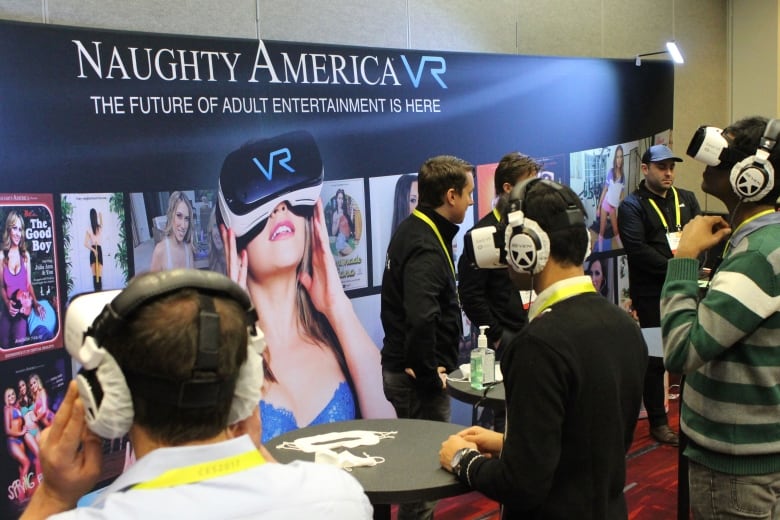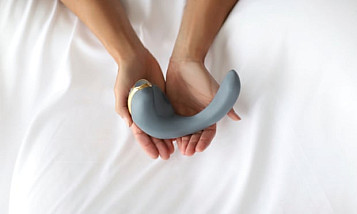CEO Lora Haddock says products designed for men like sex dolls and VR porn are allowed at the event
The Osé sex toys has been barred from exhibition space at the 2019 Consumer Electronics Show in Las Vegas. (Lora Dicarlo)
comments
Listen6:33
When Lora Haddock learned that her company’s robotic sex toy was going to win an innovation award and be put on display at this year’s Consumer Electronics Show, she was «stoked.»
Sex toy company Lora DiCarlo’s robotic massager, called the Osé, was developed at Oregon State University’s robotics lab and bills itself as a «product designed for hands-free blended orgasms» that uses «advanced micro-robotics» to mimic human touch.
But as the staff at Lora DiCarlo started prepping for the event, Haddock got an email from the Consumer Technology Association, which organizes CES, rescinding the offer.
It cited a clause in the award submissions guidelines that reads: "Entries deemed by CTA in their sole discretion to be immoral, obscene, indecent, profane or not in keeping with CTA’s image will be disqualified."
'Arbitrary and capricious’
«Our big thing was: How is female sexual health and wellness and female pleasure immoral or obscene?» Haddock told As It Happens host Carol Off.
«The thing that we found arbitrary and capricious and very biased was the fact that there are, in fact, other products like this at CES that have been displaying for years.»

Adult video company Naughty America provides a gander at virtual reality content during CES on Jan. 8, 2017 in Las Vegas. (Glenn Chapman/AFP/Getty Images)
She’s referring to adult product companies like RealDoll, which debuted its first sex robot Harmony at CES in 2017 and is introducing a new model named Solana at this year’s event.
Or Naughty America, which showcased its virtual reality porn at CES in 2016 and is back this year with its augmented reality porn app that allows users to use their smartphone cameras to display erotic pole dancers.
The annual tech show has also come under fire for its use of «booth babes» — scantily-clad models who draw attention to products on the exhibition floor.
«It seems to us that products that are explicitly allowed for men in an explicit sexual nature are allowed more of a pass than products that are geared toward female pleasure and female sexuality, » Haddock said.
'We don’t have a category for sex toys’
When Haddock pressed the CTA about this, she received a followup email from CTA president and CEO Gary Shapiro and executive vice-president Karen Chupka, this time with no mention of obscenity.
«Unfortunately, [Osé] does not fit into any of our existing product categories and should not have been accepted for the Innovation Awards Program, » it reads.
«We can understand your frustration, but hope you understand that we cannot make an award for an ineligible product, even if your submission was mistakenly allowed in the first instance.»

Lora Haddock is the founder and CEO of the sex toy company Lora DiCarlo. (Lora DiCarlo)
That doesn’t track with Haddock either.
«The fact is we went through a vetting process by the CTA then we followed that up with being judged by a panel of expert judges in robotics who decided we were at the top of the pile and they gave us an award, » she said.
A CTA spokesperson wouldn’t answer questions about the discrepancy between the two emails or CTA’s inclusion of other adult companies.
«The product referenced does not fit into any of our existing product categories and should not have been accepted for the Innovation Awards Program. CES does not have a category for sex toys, » the company said in an emailed statement.
«CTA had communicated this position to Lora DiCarlo nearly two months ago and we have apologized to them for our mistake.»
Lora Dicarlo bills the Osé as 'the world’s first hands-free device for the holy grail of orgasms.' (Lora Dicarlo)
But Haddock says that’s not good enough — especially in a tech industry dominated by men and plagued with allegations of sexism.
«We’re trying to have a real conversation about true inclusivity for all people in tech and really allowing women and non-binary folks and non-cisgendered males to have a seat at the table in the industry, » she said.
Written by Sheena Goodyear. Interview with Laura Haddock produced by Ashley Mak.
